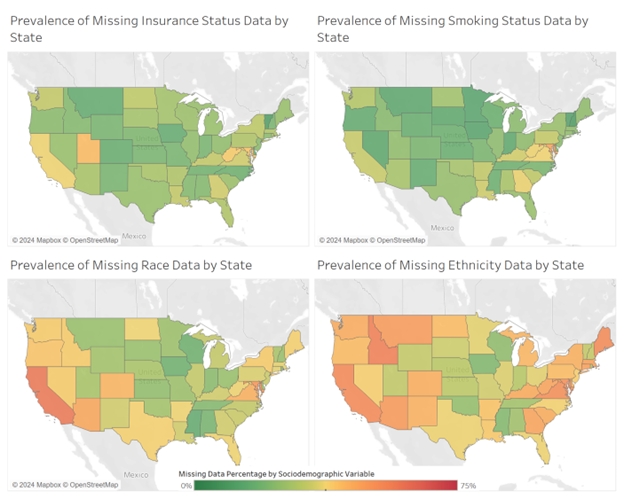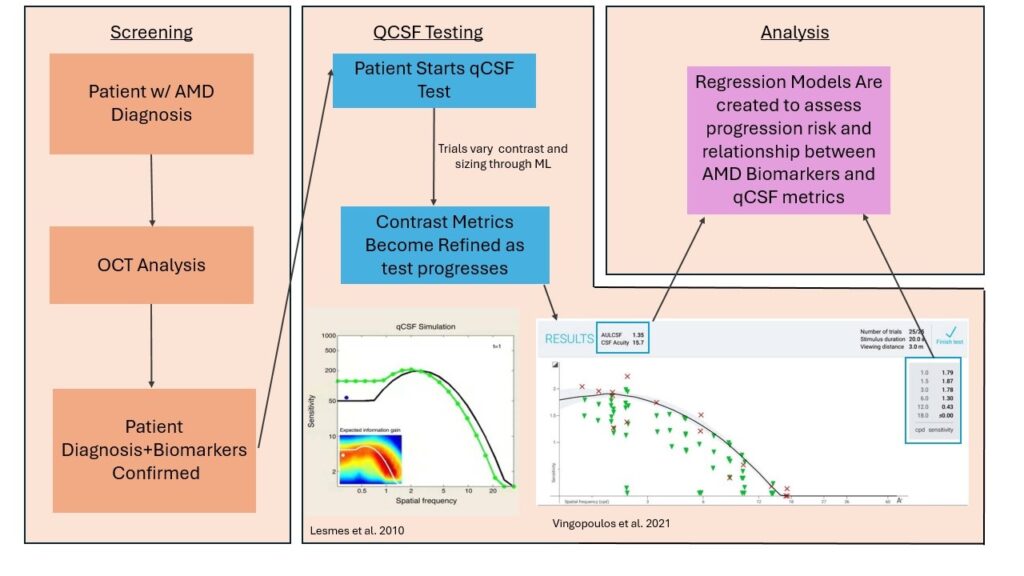AMD is characterized by 4 distinct stages depending on physiological characteristics. Intermediate AMD (iAMD) is a critical stage for many individuals as it can be characterized by significant retinal changes, initial visual deficits, and is a risk factor for progression to the advanced forms: neovascular (“wet”) and geographic atrophy (“dry”).
Ophthalmology Clinical Data Science Research Group
Ophthalmology Clinical Data Science Research Group
The Ophthalmology Clinical Data Science Research Group primarily focuses on leveraging extensive clinical databases, such as the IRIS® (Intelligent
Research in Sight) Registry and internal patient data within the Massachusetts General Brigham system. Our research aims to develop and refine robust methodology to extract meaningful insights from these vast clinical registries. Through these efforts, we strive to enhance the understanding of ophthalmic conditions and treatment strategies across a variety of specialties in ophthalmology. Our lab’s publications cover a wide range of areas in ophthalmology, some of which include: the epidemiology of corneal conditions, risk factors for glaucoma and surgical complications, and treatment trends for retinal diseases.
IRIS® Registry
Friedman Research
The Friedman lab focuses on diabetic retinopaty screening and prediction research through applying innovative devices and through the use of artificial intelligence and data science.
Rossin Research
The Rossin lab focuses on discovery and interpretation of genetic variation associated to retinal disease with a particular focus on inherited retinal disease, central serous chorioretinopathy, epiretinal membrane and proliferative vitreoretinopathy. Dr. Rossin and her group leverage large biobanks and registries and conduct patient recruitment at Mass Eye and Ear to carry out common and rare variant association studies of retinal disease.

Sobrin Research
The overall goal of the Sobrin lab is to use large datasets to better understand the genetic and non-genetic risk factors for uveitis and common retinal diseases as well the pharmacogenetics of treatment response to and complications from the intravitreal medications used to treat these diseases. Subareas of interest for the lab are: Genetics of Diabetic Retinopathy, Epidemiology of Diabetic Retinopathy, Risk Factors for Uveitis from Large Health Care Claim Databases, Pharmacogenetics, etc.
Armstrong Research
Dr. Armstrong’s research focuses on the real-world implementation of ophthalmic telemedicine, digital health, and artificial intelligence to enhance the screening, triage, and diagnosis of ocular conditions. By leveraging these technologies, Dr. Armstrong’s lab aims to improve access to care in underserved communities and reduce health disparities to develop scalable, innovative solutions that ensure equitable and efficient delivery of ophthalmic care.
Harvard Ophthalmology AI Lab
Harvard Ophthalmology AI Lab
The group focuses on the development of artificial intelligence approaches with the goal of transforming ocular disease diagnosis and prognosis. The research team was co-founded and is co-directed by Dr. Tobias Elze and Dr. Mengyu Wang and include PIs Dr. Nazlee Zebardast, Dr. Mohammad Eslami and Dr. Ines Lains.
This research is positioned in the intersection of mathematics, computer science, artificial intelligence and clinical ophthalmology. The team aims to leverage mathematical, statistical and artificial intelligence modeling to enhance the knowledge and understanding of ocular diseases and ultimately improve clinical treatment and management.


